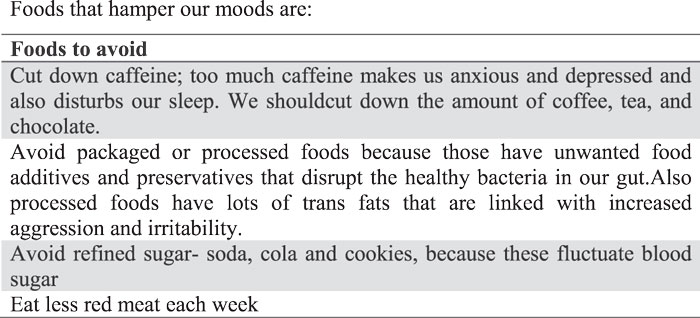To keep functioning properly, a car needs fuel. Similarly, if we imagine our body as a car and our brain as its engine, we can understand that to keep our body and brain active, we also need fuel. In this case the fuel is an adequate nutritious food. If the fuel is not good enough, then the car may not function properly. In the same way, if the food is not healthy, our body can face different complications. The complications are not only limited to physical problems but there can be different impacts on our moods and activities. Let us try to look at how our daily food intake touches our mood.
1.Moods of human beings
To understand the effects of food on our mood, first we need to understand how our brain works. In our brain, there are messengers called neurotransmitters that transfer signals to different parts of our bodies and tell us what to do and how to feel. Different nutrients of foods influence their activities, and are the building blocks of those neurotransmitters. Neurotransmitters that affect our mood are Dopamine, Serotonin, and the Endorphins Acetylcholine, and Norepinephrine.
These neurotransmitters are influenced by the types of food that we eat every day. Different nutrients are required for the synthesis and regulation of these neurotransmitters. Look at the diagram #2. to know about those nutrients.
In our body, if carbohydrate intake is very low, then the reduced glucose level in the blood causes feelings of anxiety, tiredness, irritability and headache. Serotonin is released after eating carbohydrates and it enhances calmness, improves mood and lessens depression. If we eat refined or simple carbohydrates, our blood glucose level fluctuates and if the level of glucose is too high or too low, we feel discomfort. The variation of glucose level creates our mood swings. Complex carbohydrates help to stable the glucose level in blood by enabling the slower glucose release. Amino acids found in protein rich food are necessary for the synthesis of Serotonin. To increase Serotonin level, eat more beans, kiwis, bananas, eggs and walnuts.
Protein rich food also helps our brain to synthesis Dopamine and Norepinephrine. Moreover, after eating protein rich food these neurotransmitters are released. Almonds, avocados, and pumpkin seeds raise Norepinephrine levels. Norepinephrine and Dopamine can keep us energized by promoting alertness and activity. Dopamine is associated with the feelings of pleasure, reward and motivation. To raise Dopamine level, you can eat almonds, bananas, avocados, blueberries, eggs, beans, fish, and chicken.
Another neurotransmitter, Endorphin, is involved in the pleasurable feeling generation, satisfaction and reducing pain. It is connected to our natural reward process. Simply enjoying a piece of dark chocolate, interacting with friends, watching favorite TV shows can help raise endorphin levels. Foods that possess high levels of vitamins and minerals play an important role in boosting Endorphin production. Strawberries, animal proteins, oranges, grapes, nuts and seeds are good sources for raising Endorphin level.
Acetylcholine plays a vital role in learning and memory. It is required for concentration and focus. Acetylcholine is not a component of foods; it is built from choline. Eggs, milk, organ meats and whole-wheat products are the sources of choline.
- Nutrients to support neurotransmitter synthesis
Foods that can boost our mood are as below:
Mental illness is one of the leading global health problems and results in significant social, economic and physical burdens. Pharmacotherapy and psychotherapy both can play an important role in the treatment of mental health, however food also contributes significantly to the prevention, and management of mental health conditions, which are yet to get proper attention.
In a study called SMILES trial, researchers split nearly 70 people with depression and poor diets into two groups. One group had no form of therapy; instead they switched to a Mediterranean-style diet; rich in fruits, vegetables, olive oil, low-fat dairy, fish, eggs, seeds and nuts. The other group had regular therapy, but they had no change in their food. They ate sweets, processed meats and salty snacks. After three months the researchers found that the healthy diet group had fewer symptoms of depression than the other group.
A comparison study on traditional Japanese and Mediterranean dietsversusa Western diet found that the risk of depression is 25-35 percent lower for those who had a traditional diet.
Drinking two to three cups of green tea a day is linked with lower symptoms of depression in elderly people according to a Japanese study.
Our food and the available bacteria in our gut are connected in different ways that can affect how we feel and behave. Keeping our gut healthy can keep our brain healthy. Research found that people who take probiotics (food that has live micro-organisms) rich food reduce the anxiety and stress levels compared to those who do not take that.

Those who consumed high amount of trans fat increased their risk of depression by up to 48 percent according to another study. It was also found in another study that a diet with refined and processed food increases depression by 50 percent.
A proper healthy diet can help maintain good mood and health, in another sense a productive life. So, eat food wisely as one way to a happy and enjoyable life.
Sharmin Sultana is a Public Health Professional and Freelance Writer.
sharmin.sk@gmail.com